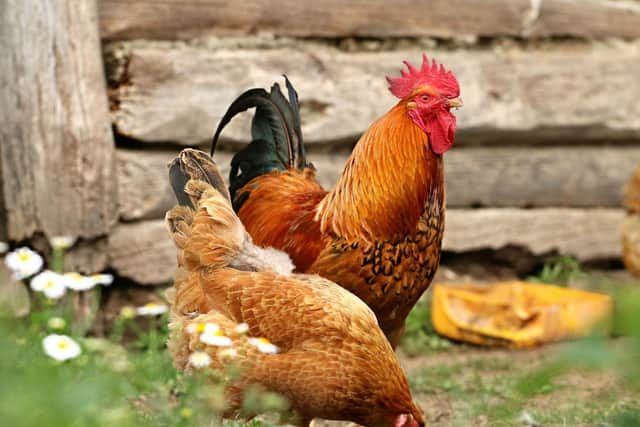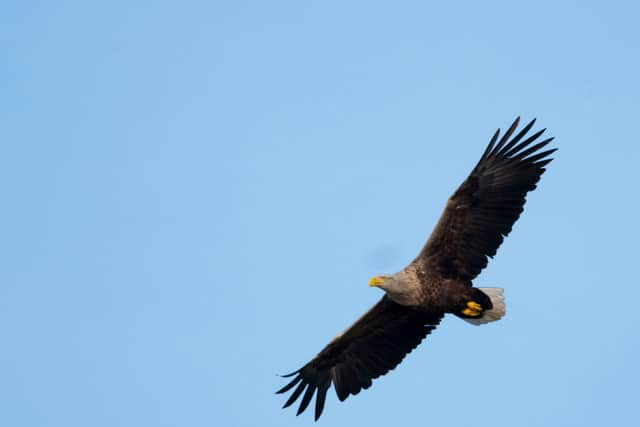Avian Flu: What is avian bird flu and how bad is the Scottish outbreak?
and live on Freeview channel 276
The UK is currently experiencing what has been called “the largest ever outbreak of avian influenza”.
Although the disease originates in birds, there have been small numbers of cases found in humans over the years.
Advertisement
Hide AdAdvertisement
Hide AdHere’s all you need to know about bird flu, how it affects humans, and what the outbreak is like in Scotland.
What is avian flu?
Avian flu, also called bird flu, is an infectious disease that spreads among birds.
Some strains of avian flu can affect humans as well as birds, although the majority don’t


There are four strains that have caused concern to humans in recent years:
- H5N1 (since 1997)
- H7N9 (since 2013)
- H5N6 (since 2014)


- H5N8 (since 2016)
Advertisement
Hide AdAdvertisement
Hide AdFor the first three, the number of cases amongst humans was low, leading to a handful of deaths over the years.
However, H5N8 was found to have infected a small number of people in Russia in February 2021.
In recent weeks, the Scottish Government confirmed that highly pathogenic avian flu, strain H5N1, has been confirmed in Scotland and in other parts of the UK.
UK environment secretary, George Eustice, warned the House of Commons that the UK is now seeing “the largest ever outbreak in the UK of avian influenza, with 36 confirmed cases”.
Advertisement
Hide AdAdvertisement
Hide AdThere are 40 infected premises in the UK, in comparison to just 26 last winter.
Roughly half a million birds have been culled across the country to try and stop the spread, thought to be spread by migratory wild birds from Europe.
This culling is not thought to be likely to affect food supplies in the run up to Christmas.
What are avian flu symptoms in humans?
Avian flu can spread to humans by them touching infected birds, droppings, or from preparing infected poultry for consumption.
Advertisement
Hide AdAdvertisement
Hide AdYou cannot catch bird flu from eating fully cooked poultry or eggs.
Symptoms vary depending on the strain of the flu.
In humans, it mostly exhibits itself through flu-like symptoms, such as fever, coughing, sore throat, runny nose, and aches and pains.
Symptoms of the H5N1 strain can also include conjunctivities, meaning red and sore eyes or having discharge from eyes.
Avian flu in Scotland
So far, cases of avian flu have been found at three different premises around Scotland.
Advertisement
Hide AdAdvertisement
Hide AdThese are near Annan in Dumfries and Galloway on December 9th, near Gretna in Dumfries and Galloway on December 3, and at a premises near Arbroath, Angus, on November 4.
In order to restrict movement and reduce the spread of the disease, protection and surveillance zones have been set up around these premises.
Outside of this, cases of avian flu have been found in dead wild birds in the following locations:
- Aberdeenshire
- Angus
- Dumfries and Galloway
- Falkirk
- Fife
- Highland
- Midlothian
- Perth and Kinross
- South Lanarkshire
As noted above, avian flu is thought to be spread through the migration patterns of wild birds.
Advertisement
Hide AdAdvertisement
Hide AdOne example is the death of a rare white-tailed eagle found on the Isle of Skye, and confirmed to have tested positive for avian flu after a postmortem.
Experts believe that it may have fed on infected greylag geese and subsequently contracted the disease.
Bird keepers are being encouraged by the Scottish government to house and net their birds and employ good hygiene methods, like disinfecting clothing and equipment regularly, to reduce the spread of the flu.
Bird gatherings have also been prohibited according to species since November 8th, meaning that kept galliformes, such as chickens, turkeys, pheasants, partridges, quails and other land fowl, and kept anseriformes, such as ducks, geese, swans and other water fowl, are prohibited from gathering.
Comment Guidelines
National World encourages reader discussion on our stories. User feedback, insights and back-and-forth exchanges add a rich layer of context to reporting. Please review our Community Guidelines before commenting.

